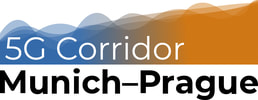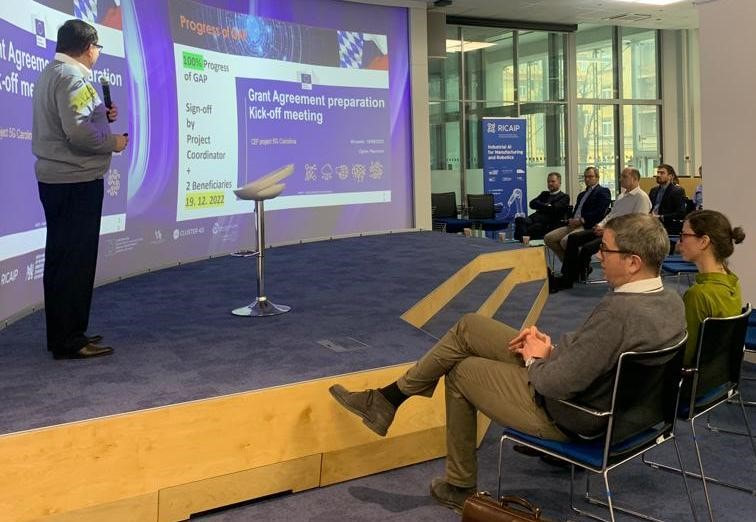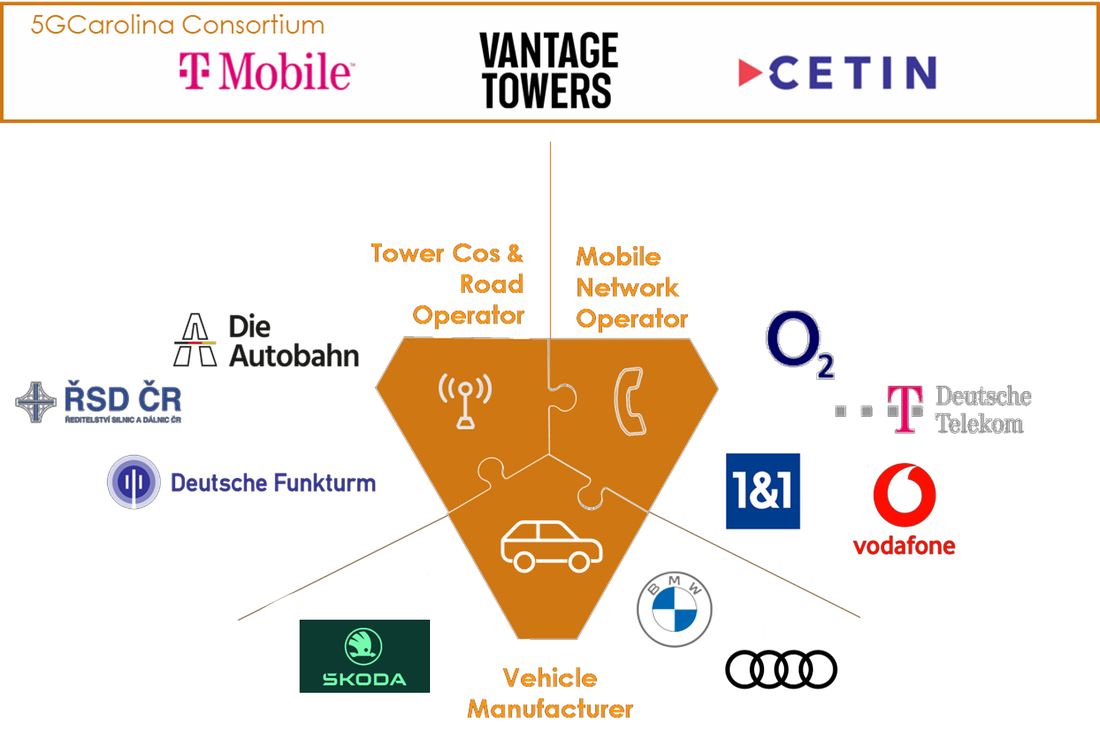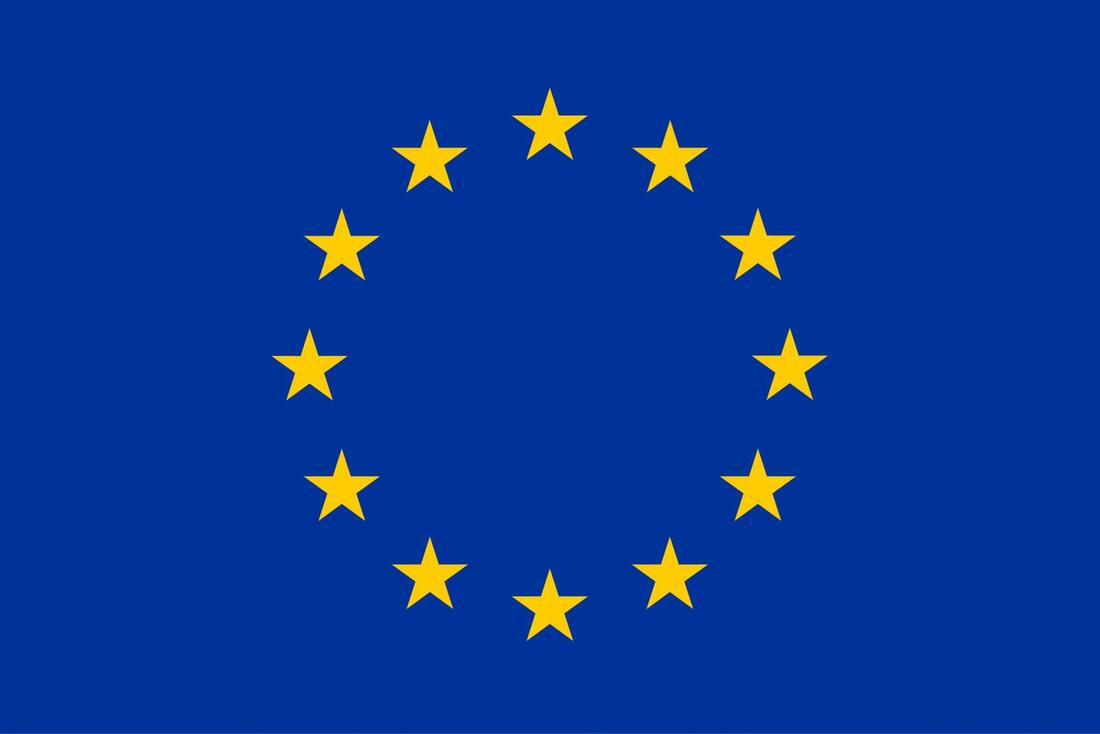|
The 5G Corridor Munich-Prague is a political high-level initiative, driven by the Bavarian State Chancellery and the Czech Ministry of Transport for future cooperation in the construction of a 5G Corridor Munich-Prague in order to jointly push forward digital transformation across borders.
The deployment of 5G cross-border corridors throughout Europe is expected to contribute to the green and digital transformation of the European economy and society. 5G-enabled, Co-operative, Connected and Automated Mobility (CCAM) is seen as a major lever for improved road safety, optimised traffic, reduced CO₂ emissions, and industrial competitiveness of both the transport and mobility sector. |
The European Union set ambitious connectivity targets for 2030 for which mobile coverage along transport corridors remains a challenge in many EU Member States. To boost this coverage, the EU is funding deployments of 5G cross-border corridors as part of the “CEF 2 Digital” program.
Embedded in the “5G Corridor Munich-Prague”, 5GCarolina – A secure Highway Corridor Munich – Prague was designed as an inception study in the first half of 2023 following the EU vision of secure 5G highway corridors for autonomous vehicles. The project is part of the Strategy Connected and Automated Mobility on European transport paths.
The 5G corridor offers the following advantages:
Under the lead of T-Mobile Czechia, CETIN and Vantage Towers AG, a consortium of 13 partners joined forces and – supported by private, national public and EU funds – defined and created a 5G corridor that meets the expectations of individual and professional users in modern, automated transport.
The outputs of the 5GCarolina study are:
Taking advantage of existing infrastructures, expertise, trials, and funding, the inception study aimed specifically at preparing the 5G systems deployment needed along the 5G Corridor Munich-Prague to enable CCAM throughout the network across all Mobile Network Operators and Vehicle Manufacturers. The focus of the study was on defining the parameters required to establish safe and reliable mobile communication for automated driving in the corridor. These parameters will be the foundation for a subsequent deployment project, which has recently been submitted to the European Commission.
Embedded in the “5G Corridor Munich-Prague”, 5GCarolina – A secure Highway Corridor Munich – Prague was designed as an inception study in the first half of 2023 following the EU vision of secure 5G highway corridors for autonomous vehicles. The project is part of the Strategy Connected and Automated Mobility on European transport paths.
The 5G corridor offers the following advantages:
- Sharing of infrastructure: CCAM for digital Automotive and Gigabit mobile coverage is only feasible with sharing of infrastructure since the cost of deploying and maintaining network infrastructure dedicated for CCAM connectivity, especially in remote or less populated areas, may not be economically viable for private telecom operators alone.
- Expertise sharing: With partners from all relevant industries, much of the needed knowledge is made available for the creation of a long-term cooperation.
- Increased road safety: Data exchange and connectivity to traffic can increase driving safety, for example through collision avoidance.
- Innovative transportation: Empowering autonomous and efficient driving and other CCAM services.
- Enhanced user experience: 5G enables better media entertainment during travel, supports communication and HD mapping.
Under the lead of T-Mobile Czechia, CETIN and Vantage Towers AG, a consortium of 13 partners joined forces and – supported by private, national public and EU funds – defined and created a 5G corridor that meets the expectations of individual and professional users in modern, automated transport.
The outputs of the 5GCarolina study are:
- Definition/categorization of OEM (original equipment manufacturer) use cases & requirements for CCAM services
- Design/implementation of 5G technology MNO (mobile network operator) architecture to provide stable, high-performance and secure CCAM services
- Design and implementation of passive infrastructure for installation, support & operation of MNO services
- Compliance validation of 5G CCAM services with EU/national laws & regulation
- Evaluation of Best Practice in synergistic 5G highway corridor projects
Taking advantage of existing infrastructures, expertise, trials, and funding, the inception study aimed specifically at preparing the 5G systems deployment needed along the 5G Corridor Munich-Prague to enable CCAM throughout the network across all Mobile Network Operators and Vehicle Manufacturers. The focus of the study was on defining the parameters required to establish safe and reliable mobile communication for automated driving in the corridor. These parameters will be the foundation for a subsequent deployment project, which has recently been submitted to the European Commission.
|
Figure 1: 5GCarolina Partners
|



